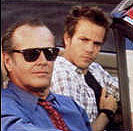|
|
|
|
Blood
and Wine
|
 |
|
It is sad, for any lover of '70s American cinema, to see where many of the best directors of that era have ended up. Filmmakers including Jim McBride (David Holzman's Diary [1968]) and Monte Hellman (Two-Lane Blacktop [1971]) have been reduced to working in well-worn genres – bringing whatever craft and imagination they can to basically mediocre scripts. It has come to this for Bob Rafelson, too. Once lauded for his daring hybrids of American sensibility and European style in films such as Five Easy Pieces (1970) and The King of Marvin Gardens (1972), Rafelson now embellishes the margins of largely uninspired thrillers and comedies. At least one key collaborator has stuck by him all along: Jack Nicholson. But their work together on Blood and Wine shows how far contemporary American cinema has declined since its glory days. This is by no means a bad film. Indeed, in comparison with most contemporaneous thrillers, it has a tautness and sureness of purpose which have become rare items in mainstream cinema. And Rafelson's work is (as always) quietly, subtly felicitous; he is a master of gesture, a wizard with narrative economy, and a terrific director of actors. But is hard to work up much excitement over Blood and Wine. For the most part, it assembles the elements of a contemporary film noir that have become tired and familiar since Body Heat (1981): a guy, Alex (Nicholson), down on his luck, looking for the one big criminal break; his seedy, quasi-psychotic accomplice Victor (Michael Caine); a younger man, Jason (Stephen Dorff) caught in a quasi-Oedipal intrigue between Alex and their mutual love-interest Gabrielle (Jennifer Lopez). To the usual plot intrigues – a heist that does not go to plan, a misplaced booty, pursuit, confrontations – Rafelson and his writers do manage to add some novel touches. The bad marriage between Alex and Suzanne (Judy Davis) is vividly and darkly etched. And the sense that unpredictable human passions scuttle every bet on the future is conveyed strongly. The best aspect of Blood and Wine is its ambiguity. The characters often find themselves caught between conflicting emotions – as in the superb moment where Alex hovers over the bleeding body of Suzanne in an auto-accident, concerned for her life but simultaneously needing to know where she has hidden his stolen jewellery. And we in the audience are also often placed in a position where we cannot easily judge the actions or motivations that we behold – especially where the fiery Gabrielle is concerned. Alas, if only such compelling ambiguities were at the centre of this tale, rather than on its margins. It is a strange world indeed where film buffs have to become detectives in order to find the artistry buried in otherwise formulaic, easy pieces. MORE Rafelson: Black Widow © Adrian Martin April 1997 |
![]()